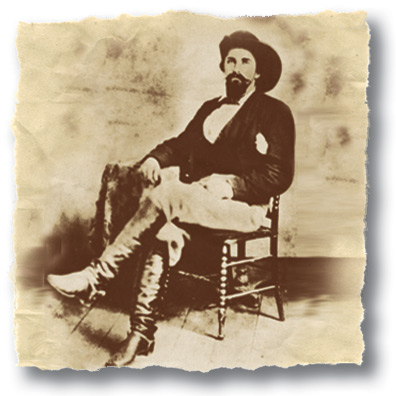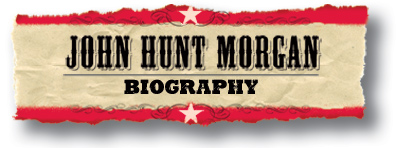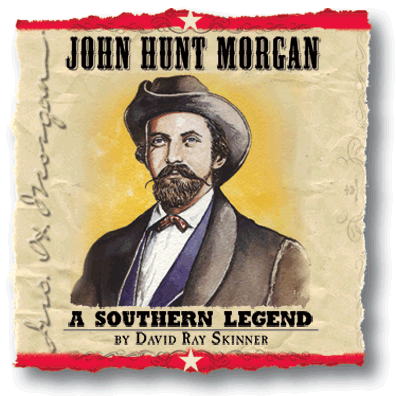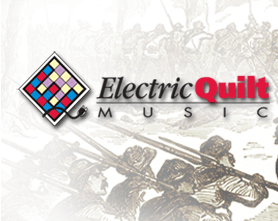
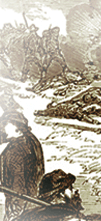

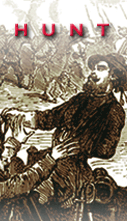
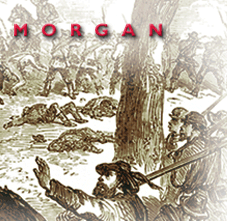
But still, Morgan had a yen for military service, and in the late 1850's he organized the Lexington Rifles, a pro-Southern militia. His command of the militia was to set the stage for his Confederate cavalry activities.
In 1861, Kentucky remained neutral. Morgan, like most Kentuckians was forced to choose sides. As a pro-Southern business owner, he flew a rebel flag over his factory, and as the commander of a militia, he was clearly a threat to the Union. When he smuggled militia rifles out of town, leaving empty crates for the Federals to "confiscate," his arrest warrant was issued. He lost his factory, and when Becky (who had been ill for some time) died in July, he had nothing to live for but the new republic.
Morgan joined the Confederacy and assumed his command in the Autumn of 1861. He was joined by his brother-in-law, Basil Duke, and eventually by his brothers, Tom (who had enlisted in early July, 1861), Cal, Charlton, Dick, and later on, Key. Morgan saw action at Shiloh, and even led what the Southern press called a successful cavalry charge, but he was frustrated by his inability to operate in the guerrilla fashion that he had been accustomed to. He was more experienced at staging lightning raids and harrassing certain targets, in particular, the L&N Railroad, a major line of supply for the Union army occupying sections of Middle Tennessee.
By early 1862, Morgan had earned a reputation both in the North and South for his daring raids and was even being compared to the famous Revolutionary War guerrilla, Francis Marion. In February of that year, he moved his headquarters to Murfreesboro, Tennessee and became friendly with Charles Ready, a prominent lawyer who had served as a U.S. congressman from 1853 until 1859. After several dinners at the Ready home, Morgan became quite smitten with one of the Readys' daughters, Martha, who was affectionately known as Mattie. The age difference didn't seem to matter...he was 37 and she was 21...the two became engaged in March, and were married the following December. The ceremony was a storybook wedding and was performed by Leonidas Polk, an Episcopal bishop who served as a Confederate general. It was, in fact, a double celebration; Morgan had been promoted to brigadier general the day before the wedding. Ten days later, however, Morgan was back at work, this time conducting his infamous Christmas Raid, an excursion that would divert 7,300 troops from Rosecrans' advancing army and would close down the L&N for five weeks.
In the summer of 1863, Morgan embarked on his most dangerous, ill-advised, and self-destructive raid yet. It was a raid that would take him and his raiders into Indiana and Ohio... farther north than any other Southern force would advance in the course of the war. Morgan had gotten the approval from Bragg to attack Louisville, but, knowing such a scheme would never be approved, he failed to mention that his plans included the crossing of the Ohio River.
In conducting his Great Raid, Morgan's ultimate goal was to divert Federal troops in Union-occupied Tennessee, enlist new recruits in Kentucky, create mass confusion and terror in Indiana and Ohio, and then to cross over into Pennsylvania and join forces with Lee. Unfortunately, Morgan's overconfidence kept him from using his scouts as he typically used them, and the summer rains had caused the Ohio River to rise, which impeded his crossing and allowed Union gunboats to help prevent his escape, and to make matters worse, Lee was having problems of his own in Gettysburg.
Morgan and his men were captured and sent to a maximum security civilian prison in Columbus, Ohio. After a few months of prison life, however, he and Thomas Hines a several of his officers devised a plan to tunnel out, using the airshaft below the cells on the lower level. Although risky, the plan succeeded, and on November 27, 1863, Morgan and six of his men escaped, separated, and with the exception of the two who were caught, made their way back south. Morgan and Hines changed into civilian clothes and caught a southbound train. Morgan even sat next to a Union officer as the train passed by the prison where he had been confined only hours before.
Once he was safely back behind Confederate lines, Morgan tried to reassemble an army to replace the one he lost in Ohio. However, things had changed. Although the Southern press hailed him as a hero, the Confederate command gave him a chilly welcome...mainly because he had failed to inform them of the plans of his ill-fated raid. Although he tried desperately, he was never to achieve the successes of his previous raids. Also, some critics claimed that he had simply grown more cautious since his marriage to Mattie. In fact, he had promised Mattie that he would never be captured again.
In the summer of 1864, Morgan was reeling from accusations that he had been involved in the robbery of a civilian bank in Mt. Sterling, Kentucky. Some of his men had been involved in the crime, but to this day there is no evidence that Morgan knew about it beforehand. On the eve of September 4, 1864, Morgan was still trying to clear his name and hold off an impending court martial. He was staying in the home of a friend in Greeneville, Tennessee with his men camped near by. On the morning of the fourth, a surprise attack was mounted by the Federals through the streets of Greeneville. Morgan, remembering his promise to Mattie, tried in vain to escape and was shot in the back by Andrew J. Campbell, a Confederate-turned-Yankee private. He died a few minutes later on the Greeneville street.
© 2016 Electric Quilt Music. All rights reserved.
